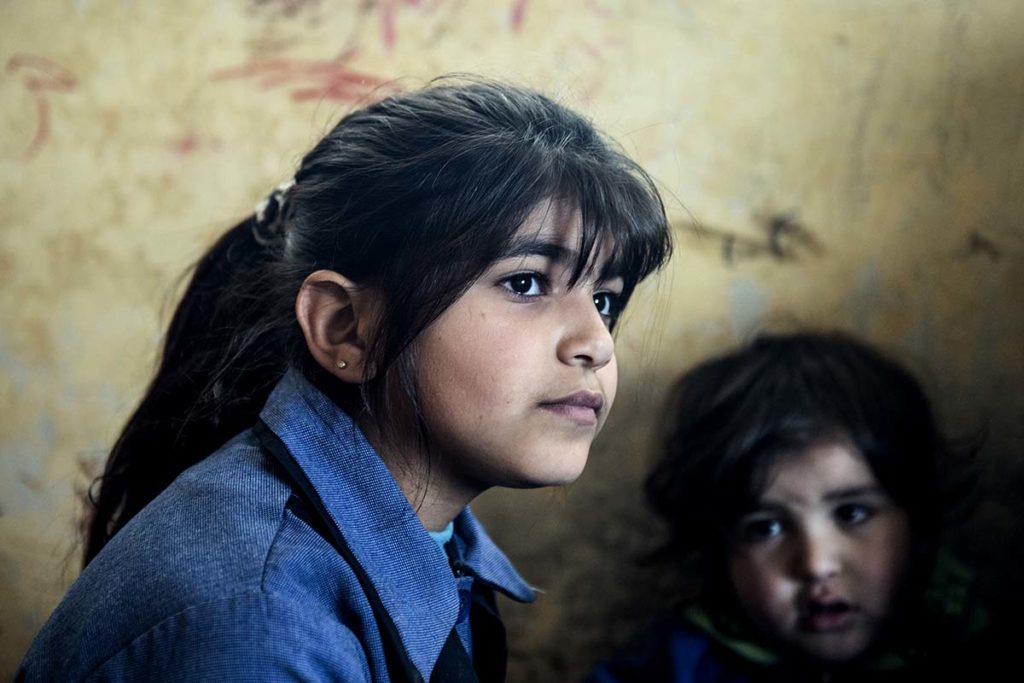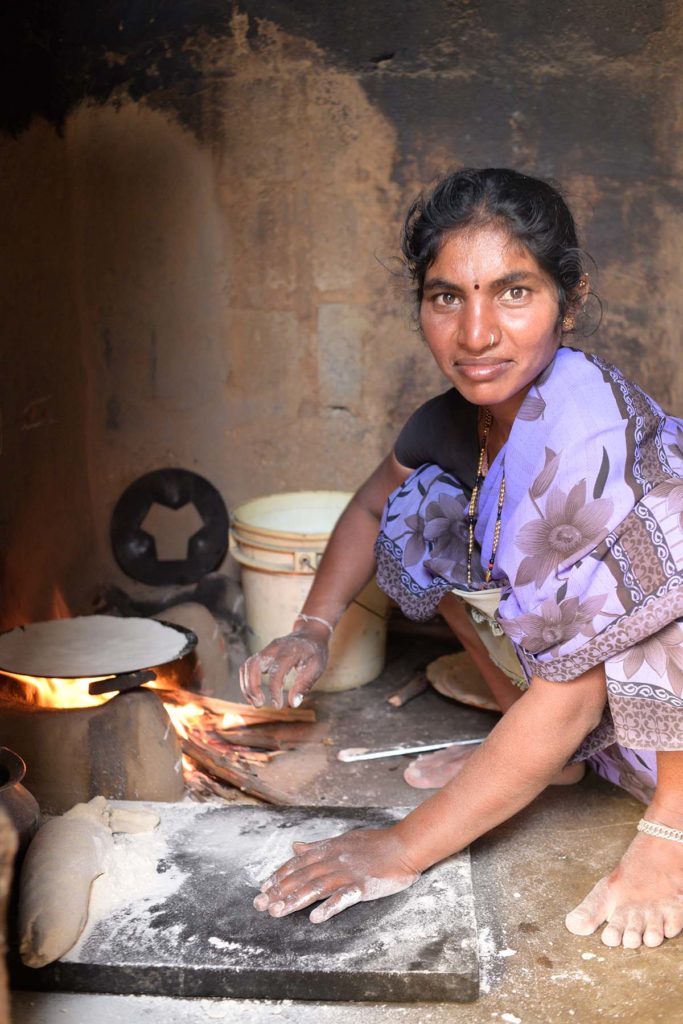Photo: Fishermen in Abidjan, Ivory Coast, beneficiaries of Stella Maris, ICMC’s partner through the Future of Work project.
In 2021, ICMC strove to further our knowledge of current and evolving issues around migration that impact the lives of uprooted people throughout the world. We continued to create opportunities for communities of welcome, authorities at all levels, and people on the move to share experiences and gain needed tools and skills to make migration work for everyone.
Promoting Decent Work in the Pandemic Era
For the fourth year, ICMC coordinated the Catholic-inspired project “The Future of Work – Labour after Laudato si,’ ” a collaboration with the International Labour Organization and the Vatican’s Dicastery for Promoting Integral Human Development. The initiative aims to contribute to nothing less than a rethinking of the world of work into one that is person-centered and care-driven.
Throughout 2021, we strove to bring the results of the project’s three-year, in-depth research—including our two publications on migrant workers—to those shaping labor policy and practice at all levels of society. We worked closely with the Vatican’s COVID-19 Commission to monitor the impact of the pandemic on work and workers.
In May, ICMC and other Catholic-inspired organizations met ahead of the 109th International Labour Conference the following month, the annual policy-setting mechanism of the International Labour Organization (ILO). Our Future of Work webinar took a closer look at an ILO policy document that examines the impact of COVID-19 on the world of work. We stressed the need to protect the most vulnerable workers, including migrants, to promote decent work in the pandemic era.
During the 109th International Labour Conference in June, ICMC highlighted how COVID-19 had made migrant and refugee workers more vulnerable despite their significant role in the pandemic response. Our statement “No One Is Saved Alone” stressed that the success of global recovery depends on the inclusion of uprooted people—in particular by ensuring universal access to healthcare, vaccines, and decent work. Further, we noted the need for international cooperation to defend the dignity of all workers, including migrant laborers, and a greater awareness of our fundamental interdependence as a global community.
Work that cares, that contributes to the restoration of full human dignity, will help to ensure a sustainable future for future generations. This dimension of care involves, first and foremost, the workers.
Pope Francis, quoting the “Care is work, work is care” report of “The Future of Work – Labour after Laudato si’” project at the 109th International Labour Conference in July. His address stressed the need to protect migrant workers’ rights.
Enhancing Integration in Europe
In 2021, ICMC Europe published the results of research on the impact of COVID-19 on the welcome of refugees. We launched studies looking into how to make integration practices more sustainable and improve community sponsorship.
In February, ICMC Europe released findings from an online survey about how the pandemic has affected the welcome and integration of uprooted people in Europe. Responses from civil society organizations and public authorities in rural areas of 16 EU countries revealed that COVID-19 has created both challenges and opportunities as communities seek to include refugees and migrants. The findings also showed that European NGOs are making extraordinary efforts to adapt to pandemic realities so that newcomers are not left behind.
Together with the survey results, we published a searchable library of best practices implemented by welcome and integration actors in response to COVID-19, such as producing informational material in languages and formats readily accessible to newcomers, moving activities and services online, and strengthening volunteerism and partnerships between civil society and authorities.
In April, we held a webinar to present the survey’s findings on welcoming migrants and refugees in France during pandemic times. Over 125 participants discussed how the lessons learned from integration efforts during COVID-19 might inform future practice as Europe recovers from the crisis.
It is crucial that we learn the lessons of COVID-19 and take the good practices it has prompted into the recovery period.
Petra Hueck, ICMC Europe Director, on study findings about the pandemic’s effect on refugee and migrant inclusion in Europe
In March, ICMC Europe partnered with the EU and academia to kick off research within the SprINg project. This two-year initiative aims to develop more sustainable practices—national, regional, and local—to support the integration of newly arrived migrants in communities across Europe.
Our study, published at the end of June, identifies both existing communities of practice and actors who are new to the welcome of migrants in 18 EU Member States. The report serves as an engagement tool to better understand the needs of communities and to develop approaches to integration that are participatory in nature.
Within the Share Network’s Quality Sponsorship Network (QSN), ICMC Europe began a research project to support better integration of refugees by improving the design of community sponsorship programs.
We are partnering with research experts from the academy to interview sponsoring groups, refugees, supporting organizations, and the broader community in Belgium, France, Germany, Ireland, Italy, and Spain about their experiences, both challenging and inspiring, with community sponsorship.
Ending Violence against Children in Jordan
In 2021, ICMC Jordan conducted two research projects to improve protection for one of the most vulnerable groups of people on the move—children.

Our study on child marriage in refugee and host communities in Jordan looked at the factors behind this harmful traditional practice, which has devasting impacts on both children and wider society. We found that extreme poverty and gender discrimination play a central role, driving families to arrange an early marriage as a survival strategy that intends to ensure that a girl child is provided for.
Based on our research, we make 16 recommendations for humanitarian actors, government, and donors to work together to break down gender stereotypes and strengthen economically vulnerable groups like forcibly displaced people. In the report, we also propose to build up existing programs, such as ICMC life skills courses for at-risk girls, that are already helping to turn the tide of child marriage.
A second study by ICMC in Jordan in 2021 mapped the pandemic’s impact on violence against children in the home. We completed community-based research on attitudes of refugee and Jordanian families about physical punishment and other kinds of violence toward children within the household. Using the data that was collected, we outline steps rooted in the local context that NGOs and State authorities can take to end domestic violence against children in Jordan.
Building Capacity to Welcome and Protect
Last year, through the Share Network, ICMC Europe began partnering with the social advocacy group Citizens UK to strengthen the efforts of groups that are sponsoring refugees to resettle in their communities. We are developing training to build the capacity of both organizations giving leadership and volunteer sponsor groups. We aim to help them improve their skills to engage the wider community and local authorities in welcoming refugees. We also aim to support community sponsorship in rural areas.
In 2021, ICMC partnered with the Rohingya Society in Malaysia (RSM) to enhance their ability to run a supportive and COVID-19-compliant transitional home for refugee survivors of sexual and gender-based violence and their accompanying children. We worked with RSM to maintain hygiene measures, ensure that staff were fully vaccinated and had personal protection equipment (PPE), and improve safety on the premises.
ICMC Malaysia provided senior staff at the transitional home with skills training in case management, shelter assessment, and employee recruitment. We supported staff as they upskilled through classes in cooking, sewing, communicating in the workplace, and responding to reports of sexual and gender-based violence.
ICMC equipped some 40 staff in Jordan and Malaysia to better protect children by preventing online exploitation. A four-month, dedicated training raised awareness of the risks of digital platforms for children, practical steps to keep young people on the move from harm, and ways to respond if abuse occurs.
MEMBER’S STORY
Improving Support for Migrant Workers
Some nine million of India’s 1.3 billion inhabitants migrate within the country each year to earn a living or to marry. The city-state of Delhi is one of their main destinations, with migrant laborers making up about an eighth of its 2011 census population of around 16 million people.
In March 2021, the two ICMC members in the country published findings from research that took a closer look at the situation of a group of these migrant workers and the assistance available to them in order to propose ways to improve living and working conditions.
The study “Tribal Migrants in Delhi City: A Pre-Covid and Post-Covid Analysis” was a joint project of the Commission for Migrants of the Conference of the Catholic Bishops of India (CCBI) and the Workers India Federation, an initiative of the Office for Labour of the Catholic Bishops’ Conference of India (CBCI). Its analysis focused on Tribal labor migrants from neighboring states working in construction in Delhi. The industry accounts for about 60% of the unorganized sector, where wages are low and regulations are lacking.

“The study was an attempt to look into various factors behind migration, the various problems these Tribal migrant workers face, and to analyze support systems government agencies and NGOs have for them,” said Father Jaison Vadassery, who provides leadership for both of the Catholic Bishops’ entities that ran the study.
Survey follow-up, including case studies and focus groups, revealed a high level of vulnerability that has increased during the pandemic. Job contracts and medical or social benefits are nonexistent. Wage discrimination is common, with rates below the government minimum. Few of the migrant workers are paid regularly, and wages are often withheld. Lockdowns have meant a loss of livelihood, forcing workers to return to their villages and take up jobs that pay much less. Upon their return, many labor migrants struggled to find work again.
Fr. Vadassery noted that the plight of Tribal migrant workers such as those surveyed in Delhi is rarely on the policy radar. “There have been few real attempts to address [their] problems. There are legislations to protect their interests, but [these] remain only on paper.”
Based on study findings, which reflect realities encountered in the Church’s work throughout the country, ICMC members recommended a policy strategy that does not focus on just one dimension but addresses the different issues facing migrant workers.

